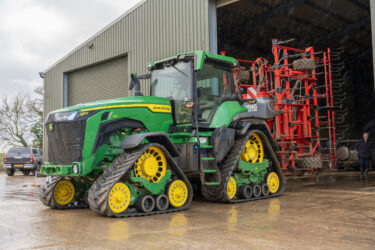The barleymow’s – episode 18

Alternative sources of income …
Henry walks into the farm office, David is knee-deep in paperwork …
Henry: Still looking over those cashflows for the next two years?
David: It’s not brilliant Dad. We’re OK, but we’ve been spoilt with a couple of cracking years from the 2021 and 2022 harvests. The 2023 harvest outcome looks as though it will be all right but not as good as those earlier years. As for the 2024 harvest – what with the wet autumn and winter – expectations are not good at all, especially with the current prices. It’s incredible how much prices have dropped and there’s not too much optimism for the years ahead either …
Henry: That’s what I feared. Perhaps we need to look at doing things differently.
David: Yes, I think we should look at maybe taking up some of the options under the Sustainable Farm Initiative (SFI). They’re financially quite attractive, especially for land which doesn’t grow us a good crop or even as part of our rotation, as some options could give us a better return than growing a break crop …
Grandad walks into the office whistling…
George: Why the long faces?
Henry: Morning Dad, David’s just talking about the new environmental schemes we could take advantage of.
George: Hmm, you mean taking land out of crop production?
David: Yes Grandad, for certain options available and…
George (interrupts): But we’ve always farmed this land for maximum crop output – why would you change that?
Henry: Because Dad, it doesn’t look as though farming in the way we’ve always known will be that profitable in the period ahead. Surely if we can improve our financial position, we need to consider these options?
George: I can’t see how we’d be considered to be “farming” anymore – surely we’d lose all our tax advantages?
David: Not quite Grandad. I’ve spoken to Ensors about this – the Chancellor has announced we can still get Inheritance Tax (IHT) relief on land managed under environmental schemes, as long as those schemes are with the government, or approved responsible bodies, including local government. Mind you, this doesn’t kick in until 6th April 2025, but I assume none of us are looking to drop off our perches between now and then?
George: I wasn’t planning to …
David: Good! And have you heard of Biodiversity Net Gain (BNG)?
Henry: Oh yes! Isn’t that similar to SFI?
David: Kind of, generally the contract is not with the Rural Payments Agency (RPA) but with other organisations required to offset the environmental effects, typically from some development project, which can include houses. The monies received from this can be very good although there is a bit more of a market in negotiating different rates of payment. We’d need to get some help in any discussions with potential organisations that might want some BNG scheme on our land, which can be for 30 or more years in some cases.
George: So what’s the tax position for that then?
David: It’s a bit more complicated Grandad and would depend on how any deal was structured. Sometimes a deal could involve a large upfront payment and perhaps smaller amounts each year, or at regular intervals. Ensors said there’s little guidance or precedent currently but some of this could possibly fall under Capital Gains Tax (CGT) and some under income tax. Bit of a mixed bag really.
Henry: What about the land value itself?
David: Well, based on what the Chancellor said, if this land is taken out of food production and the BNG contract is with one of the approved responsible bodies, then it could still be eligible for Agricultural Property Relief (APR) for IHT purposes. Clearly the devil is in the detail for this type of arrangement.
George: It always is, lad.
Henry: So, we’ve talked about SFI and BNG. Anything else?
David: There is something …
George: Uh oh!
David: I’ve had an approach from someone trying to get planning permission for a solar farm across some of our land. They’re looking at something between 150 and 200 acres of our land …
George: Solar? How’s that going to feed the bloomin’ nation?
David: The income it would generate Grandad, would be far more than growing crops.
Henry: We can’t afford to put up a solar farm there; it’d cost millions.
David: No Dad, all we’d do is provide the land. The solar developer builds it and takes the money for generating the power, but we’d get a pretty good rent per acre over 30 years or so and this is often index linked with inflation each year so would only go up.
George: Hmm, sounds too good to be true to me …
David: There are downsides; it reduces the area of our farm that we’d actually be farming and the income generated from the rentals is not considered to be trading income from the farming activity.
Henry: What’s the IHT position on the value of that land?
David: Ensors said it wouldn’t qualify for APR … even if we let sheep graze around the solar panels.
George: Scuppered, I knew it!
David: Not necessarily Grandad, Ensors reckons there’s still a chance we’d get Business Property Relief (BPR) for IHT by using the precedent set by the Balfour Case. This sets out several tests determining whether we are mainly a trading business OR an investment business. Rentals from letting our land as a solar farm would fall as an investment activity. Ensors can go through the detailed rules with us, but it’s likely a solar farm would tip us in the wrong direction and we’d lose the IHT advantage. They said we might want to consider moving ownership of this land to the youngest generation before it came out of agricultural use and went into solar development to reduce any imminent IHT exposure.
George: Sterling advice there from Ensors. Let’s get an appointment in the diary … right after one of you makes me a cuppa!

